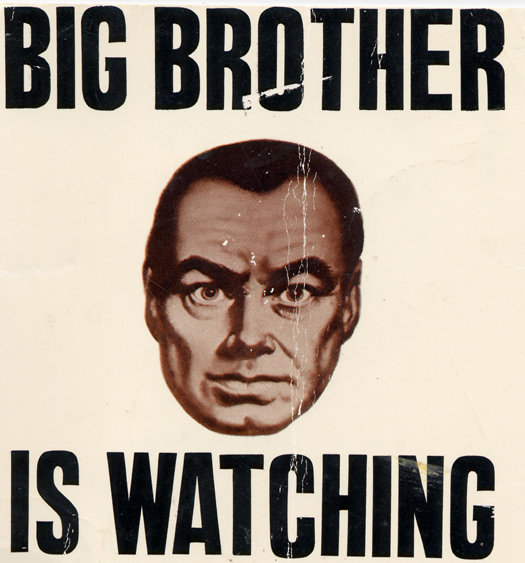 One month and 40 pages of Master’s capstone later, here’s what I know: the Fourth Amendment is a tricky thing.
One month and 40 pages of Master’s capstone later, here’s what I know: the Fourth Amendment is a tricky thing.
I’ve spent the last month exploring Katz and Olmstead and Miller and nearly every other aspect of the Fourth Amendment’s intersection with online data. I’ve explored how and where your data is protected from unreasonable searches and seizures, seen the lines that the government can cross (see the current Jones case for a prime example), and yet, at the end of the day, the only reaction I can get from anybody is…
So?
In the last two weeks, I’ve had no fewer than four people tell me, in some form or another, “if you’re not doing anything wrong, you have nothing to worry about.”
Just yesterday, I had a protracted INTERNET ARGUMENT with people who could not put it between their ears that forcing all welfare recipients to take a drug test was a massive violation of the Fourth Amendment.
It’s a fascinating thing, the Fourth Amendment, protecting us regular citizens from unwarranted suspicion, from intrusions on our privacy, from unreasonable searches and seizures. But we’re willing to throw it away because “we’re not doing anything wrong.”
But here’s the thing: no.
You don’t have to look any further than the Transportation and Safety Administration for that argument to fall apart. After all, regular folks who did nothing guiltier than book a flight are subjected to unreasonable searches every day.
The thing is, the law changes. What raises no suspicion today is illegal tomorrow. When we stop caring where unreasonable searches and seizures start and stop, we hand over our ability as citizens to be free from suspicion.
More succinctly: me today, you tomorrow.
Freedom as a whole is a tricky thing. It means the freedom to let people do whatever they want, whether you approve or not. It means the freedom to live in peace. It means the freedom to pursue your own life, liberty and property in the way you want.
I guess that’s my point: freedom is hard. It doesn’t always make sense. But the alternative is constant suspicion, constant surveillance. I choose that hard path. And I’m thankful our founders did, too.
I’ll come out. I was one of those “IfYou’reNotDoingAnythingWrong” people. It’s a mindset instilled in me by my very wise grandmother… and it was probably a reasonable notion for someone who grew up in rural Indiana in the 1920s.
Then I read your capstone. And I remembered that I received an email from an unknown sender this week. Of course I didn’t open it. Of course I promptly deleted it. But it’s still sitting in my online mailbox, and but for your paper, it would probably still be sitting there unopened 180 days from now.
I’m fairly sure it’s from a “nephew” stranded in Europe in need of money or a great deal on little blue pills… But who knows? COULD it contain information that might someday link me to someone else’s bad behavior? I suppose, in this Not-My Grandmother’s-World world, it’s possible.
It would be nice to know I’m free from suspicion despite what nonsense gets dumped in my inbox. Thanks for making me think about this whole topic.
Time was, I felt the same way, too. I’m almost certain I’ve used that phrase in the past. But for the very same reasons why I can’t support the death penalty (the unacceptable risk that the government puts the wrong person to death), I’ve come to be a strong proponent of the Fourth Amendment.
Ideally, keeping to yourself is the solution to keeping out of trouble. But what the Fourth Amendment stops is constant surveillance in the hopes that the government can catch you doing something it doesn’t like. It puts the onus on the government to prove that it has reason to believe you’re guilty instead of putting the onus on you to prove that they have reason to believe you’re innocent. It stops that Orwellian nightmare from coming true.
At the heart of it is good old Blackstone’s Formulation: better that ten guilty persons escape than that one innocent suffer.
I know where the opposition to the Fourth Amendment protections comes from. People see drug trafficking and welfare abuse and threats to national security and they reason that increasing the government’s ability to track and eavesdrop and raid will mean a safer, happier society. The ends justify the means.
But there’s more than a little truth to Ben’s opinion: “They who can give up essential liberty to obtain a little temporary safety, deserve neither liberty nor safety.” Namely, that loosening the protections of the Fourth Amendment to make it easier to catch “bad guys” is a recipe for disaster. It removes the protection we have from constant, endless surveillance and suspicion in the name of security. In the hopes that we can catch more criminals, we make more people suspects.
As a follow-up to our discussion about resisting laws that encroach on our liberties, I raised the “no harm done” objection to the GJ after the indictment of the Rx for sale case. I thought I presented the concern rather eloquently, but you could hear a pin drop in the room. Finally someone said, Are you a libertarian? Hahaha…
I think in regards to air travel that the government is throwing its weight around because if you don’t submit, you don’t fly… same reason you need a drivers license, the roads and airways are regulated by the government, so unlawful or not, I bet it’s not going anywhere. Like you said in more words, “take away the rights of a few to protect the lives of the many.”